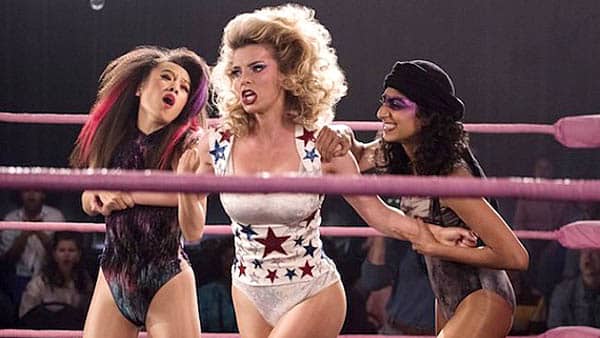Netflix’s GLOW TV series had already been greenlit for its fourth and final season when it was canceled due to the limitations of shooting during the pandemic, leaving fans devastated.
GLOW is a fictional Netflix TV series based on the real Gorgeous Ladies of Wrestling from the 1980s. The third season had been its best yet and audiences were gradually starting to see the show talk about diversity in a more open and in-depth manner.
In particular, the season three episode “Outward Bound” deepens the characters’ understanding as well as the audience’s understanding of diversity and racism.
Grieving GLOW’s Cancellation
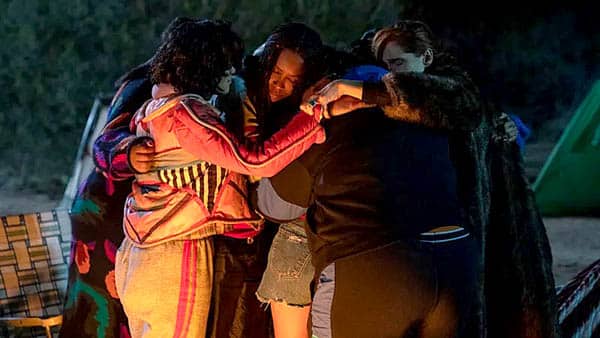
Throughout its three seasons, GLOW demonstrates the sexism and racism of Hollywood in the 80s that is still present today.
The cast of GLOW was upset about the show’s cancellation as they had worked with the TV writers to flesh out the characters of color on the show for the fourth season.
GLOW’s episode “Outward Bound” was a first step in the right direction, demonstrating how the characters’ wrestling personas contribute to and simultaneously make them victims of systematic racism, which must be confronted with understanding and empathy.
Racism Spreads Through Mass Media
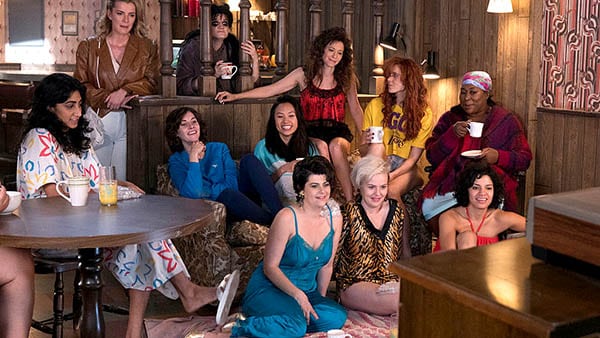
It is easy to dismiss racist caricatures as being goofy and therefore rendered harmless. Ignoring the effect that racist caricatures have on culture leads to ignoring the problem of racism as a whole and allows racism to grow.
In his book, Reel Racism: Confronting Hollywood’s Construction of Afro-American Culture, author Vincent F. Rocchio defines racism as, “the generalized and final assigning of meaning (and the values that are endangered in them) to create difference, for the accuser’s benefit and at the victim’s expense, to justify, legitimize, or naturalize the former’s privilege or aggression” (Rocchio 15).
While the racist wrestling personas the women on the show embrace provide them with jobs and some type of representation, it also reinforces negative racist stereotypes that their oppressors will use to reinforce their privilege.
These stereotypes spread through mass media, and “as several studies have indicated, individuals within contemporary mass society receive most of their information indirectly and through mediated texts rather than through direct experience” (Rocchio 5).
Since many people understand race through mass media, the racist wrestling personas that the girls play are damaging to the perception of their race in society.
Beirut The Mad Bomber
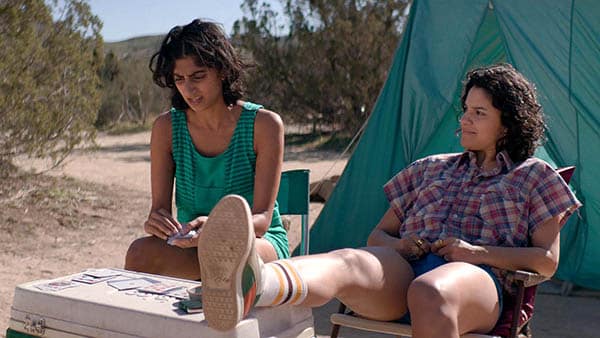
Several of the characters on GLOW struggle with their racist wrestling personas.
“Outward Bound” mostly discusses the racist personas of Beirut the Mad Bomber, played by Arthie Premkumar (Sunita Mani), and Fortune Cookie, played by Jenny Chey (Ellen Wong). Both actresses dislike the characters that they are forced to play but do so to stay on the show.
Arthie has made several attempts to play a different character, and when she finally succeeds, she expresses her relief by saying, “Do you know how freeing it was to play a character and not have to worry about georacial politics?”
However, even though Arthie is relieved from playing a Muslim stereotype, another white wrestler named Stacey Beswick (Kimmy Gatewood) embraces the role. Even though Arthie didn’t place importance in the racist persona she was playing, by playing a Muslim terrorist, she allowed others to interpret it as truth.
It is easy for audiences to accept Beirut and Fortune Cookie as characters because, “when social discourses reinforce individual identities, they are accepted, while if they contradict or fail to reinforce identity, they are rejected” (Rocchio 22).
In other words, it is easier for the audience to digest Arthie as a Muslim terrorist because she looks Middle Eastern even though she is actually Indian.
Stacy’s excitement for playing the role of Beirut proves that she doesn’t understand the racist politics behind the character. Arthie gives permission and even encourages Stacey to take the roll, allowing this racist stereotype to continue.
Fortune Cookie

Jenny also struggles with her wrestling persona. She hates the symbol of racism that she represents on the wrestling show in Las Vegas.
In “Outward Bound,” she confesses to Melrose, “Every night, I put on a kimono to jump out of a fortune cookie at an Asian-themed hotel, surrounded by white Geishas serving mai tais.” Jenny has become an icon of the racism that suppresses her.
Furthermore, she feels trapped because her white friend Melanie Danielle “Melrose” Rosen (Jackie Tohn) doesn’t seem to fully understand what’s so bad about it. Jenny is upset because Melrose had mocked her character saying, “Soy sauce in your eye! Chopstick in your nose!”.
This demonstrates how both Jenny and Melrose subconsciously contribute to systematic racism. Jenny perpetuates racism whenever she engages with her wrestling persona, which enables others to mimic and give symbolic value to the racist persona of Fortune Cookie because, “Things only mean what social orders want them to mean, because language and representation are only human constructs, as are the codes that govern them” (Rocchio 11).
It becomes apparent that previous to this episode of GLOW, Jenny and Melrose failed to have a conversation about the racist wrestling personas on the show and how it affects them. Keeping quiet is the easiest way to prevent positive social change.
Starting the Conversation
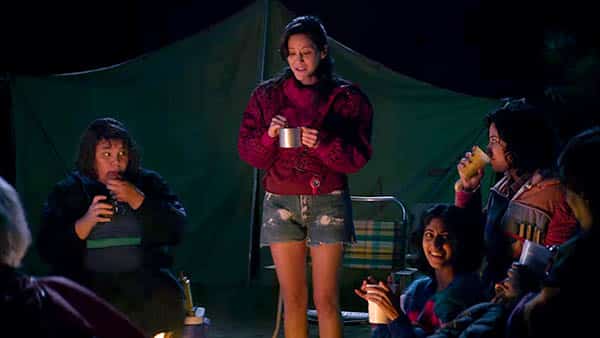
Melrose is unable to understand why Jenny is hurt because she believes that she was just “doing [Jenny] doing [an impression of a] racist character” (“Outward Bound”).
It isn’t until Melrose starts a conversation about prejudice and oppression around the campfire that she is able to understand why what she said hurt Jenny. Melrose starts by sharing a bit of her own culture and performing a Jewish Seder. This allows for both Melrose and Jenny to talk openly about their heritage.
Pretending that race and ethnicity don’t affect an individual’s role in society is to turn a blind eye to racism.
It would be ignorant to not acknowledge that “Contemporary American society is multiethnic and multiracial, but it is not color-blind — much as it would like to claim to be” (Rocchio 4).
Once Melrose acknowledges that both she and Jenny have endured different prejudices due to their race and ethnicity, she is able to understand Jenny’s plight with her wrestling persona.
Comedy is Capable of Tough Conversations
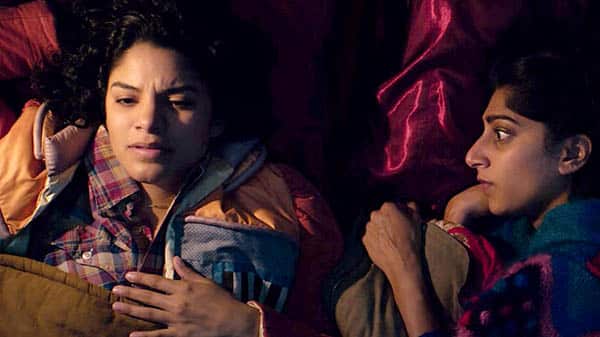
By allowing Melrose’s character to open a conversation about race among her friends, GLOW opens a conversation about race with its viewers and also within its own cast as is apparent from the GLOW cast’s push to deepen the level of diversity on the show.
GLOW is a comedy that has touched on some heavier topics, primarily sexism.
Melrose is one of the show’s primary comic relief characters, yet she is the one who opens the conversation about race to her friends when she says, “What? You’d rather I joke around? Just jokes, huh? Not really get into the trauma that’s behind all the shit we don’t want to talk about?”(“Outward Bound”).
Just because Melrose enjoys joking around doesn’t mean that she doesn’t have thoughts, feelings, or hurt relating to oppression.
Similarly, just because GLOW is primarily a comedy, it doesn’t mean that they can’t talk about tougher topics like race and oppression. All media is responsible for participating in a conversation about race and diversity and being a comedy does not give any media platform an excuse to avoid the conversation.
Pushing The Conversation Further
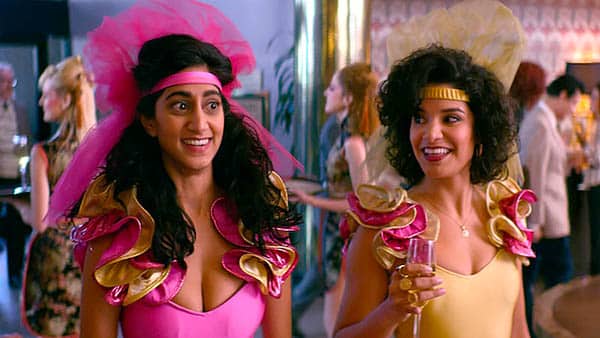
“Outward bound” pushes the boundaries of GLOW when its characters converse about their racist wrestling personas, which opens up a conversation about diversity for its characters and its viewers.
However, this conversation can and should be pushed further, not just in GLOW, but across all media platforms. As an audience, it is our duty to take these conversations and analyze them because, “[the] purpose of analysis… is not simply to expose the process of racism as it conducts itself through representation, but to uncover the images and discourse that resist or escape that process” (Rocchio 26).
The biggest flaw of GLOW’s episode, “Outward Bound” is that four white characters were off hiking, including the two female leads, Ruth Wilder (Alison Brie) and Debbie Eagan (Betty Gilpin), while Melrose and Jenny talked about race and ethnicity around the campfire.
Therefore, these characters were left out of this very important conversation. This makes Melrose’s and Jenny’s storyline seem less important because it doesn’t center around the main characters.
Also, Jenny and Melrose have no power and authority to change the racist personas in GLOW, while Debbie is a producer of the show and has more power and influence.
If she were included in this conversation, maybe she could have created positive change and given them new characters.
In order to create a more accepting world, it is necessary to work together to understand racism and its effect on society no matter what race or ethnicity a person identifies as. It takes participation from everyone to enact positive change.
